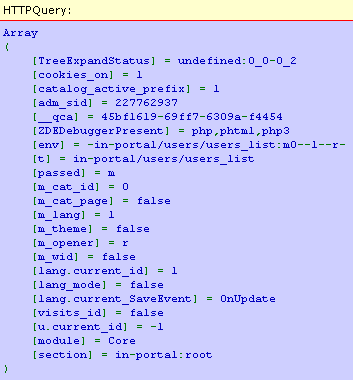K4:KHTTPQuery
From In-Portal Developers Guide
Path to article:
| Line 16: | Line 16: | ||
{{TipBox|Arrays are listed in the order in which they were added to the variables register through this class.}} | {{TipBox|Arrays are listed in the order in which they were added to the variables register through this class.}} | ||
| - | Also available are arrays $_ENV | + | Also available are arrays $_ENV and $_SERVER, but right now they're not used in K4. |
|} | |} | ||
== Data Passed by the User (From the Browser) == | == Data Passed by the User (From the Browser) == | ||
| Line 26: | Line 26: | ||
<source lang="php">env</source> | <source lang="php">env</source> | ||
| - | == User Variables (установленные из K4) == | + | == User Variables (??установленные из K4??) == |
<source lang="php">module, section</source> | <source lang="php">module, section</source> | ||
Revision as of 22:53, 2 April 2009
| ||
|---|---|---|
| Статьи в этой категории | ||
|
|
The kHTTPQuery class is used in K4 for pre-proccessing and then to safely use the following types of data:
As far as user data, we're referring to the content of the following built in PHP arrays:
Also available are arrays $_ENV and $_SERVER, but right now they're not used in K4. |
Data Passed by the User (From the Browser)
For user data it's possible to include all variables received from built-in PHP arrays. In the image above, it would be the variables with the following names:
- From array $_COOKIE
TreeExpandStatus, cookies_on, catalog_active_prefix, adm_sid, __qca
- From array $_GET
env
User Variables (??установленные из K4??)
module, section
??Разобранная?? Environment Variable
In this example, all the variables that aren't covered, are received as a result of processing the
Environment Variable. It's easy to determine these variable because their names will contain an underscorce ("_").



